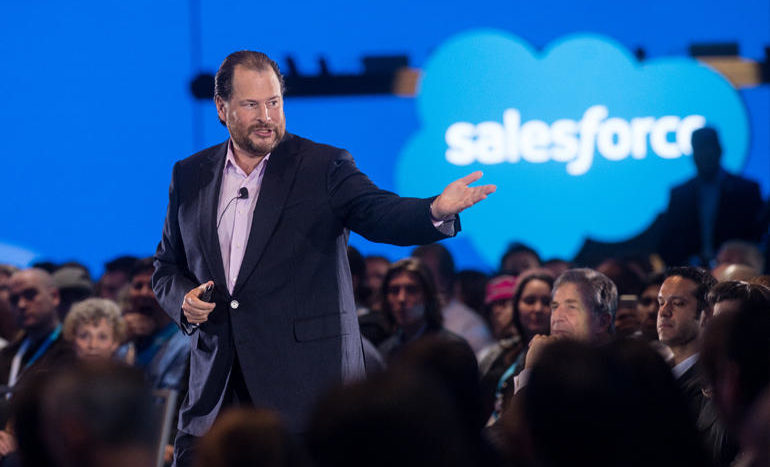M+E Connections

Salesforce’s Benioff: Twitter Purchase Would Have to Benefit Investors
Story Highlights
Salesforce CEO Marc Benioff sought to calm investors’ concerns Oct. 5, after published reports claimed the company was in talks to acquire Twitter and Salesforce’s stock price took a hit.
“We have to look at every deal,” he said during an executive Q&A session at Salesforce’s Dreamforce conference in San Francisco. But he stressed: “We would only do a deal if we absolutely felt like this was the right thing for our shareholders and stockholders, and that everyone was onboard” and it can provide a clear reason for making such an acquisition.
Usually when Salesforce is involved in a mergers and acquisition process, “rarely do you guys even know about it, [but,] in this case obviously there’s been big leaks around this M&A process, and that has been unfortunate,” he said.
But Benioff pointed out: “We look at a lot of things and we pass on almost everything.” Despite several recent acquisitions of artificial intelligence (AI) and other companies by Salesforce, there are very few companies that it ends up buying, he said. Salesforce is “extremely disciplined in what we do and how we buy,” he said, adding that acquisitions that it’s made have worked out very well for the company about 95% of the time.
Salesforce will “evaluate all of our options” and it certainly won’t agree to a deal that would include the sort of terms some investors have complained about in emails that he read, he said.
It’s important for Salesforce to at least examine whether it makes sense to acquire a major company at the right price when the opportunity arises, even if it’s a target that may not appear to be an obvious fit on the surface, he said. When there’s a “once-in-a-lifetime” opportunity to buy such a company, “once they trade, they’re not going to trade again, so you better be damn sure that it’s not right for you,” he said, adding Salesforce previously made such a purchase when it acquired Demandware for $2.8 billion early this year after being outbid by Microsoft to buy LinkedIn.
While making those specific comments, Benioff didn’t cite Twitter by name. But when asked if customers at Dreamforce had asked him about the potential acquisition yet, he replied: “Not a single customer has asked me about Twitter.”
Pivotal Research Group analyst Brian Wieser said in a research note Oct. 6 that “concerns around” Salesforce’s interest in Twitter “loomed over” the conference. But he added: “While investors may not be particularly comforted by what was conveyed, we think that a focus on [Salesforce] management and what it has built as a company should provide investors with confidence that they will produce value in the future regardless of the corporate actions they may take.” Wieser would also “be surprised” if Salesforce “ended up as the high bidder in any auction” for Twitter, he said.
In the keynote right before the executive Q&A Oct. 5, Benioff highlighted the opportunities for Salesforce and its new Einstein AI platform. It’s an “incredible new, smarter world that we’re creating together” — one in which “everyone and everything is connected,” he said.
In addition to the growing popularity of social networks, mobile devices and the Internet of Things, “now we’re seeing this incredible new world of artificial intelligence,” he said.
“It’s not just about the mobile phone” anymore, he said, pointing out that while there are six billion smartphones out there, there are 75 billion smart devices, including Fitbit watches like the one he showed attendees that he was wearing around his wrist, as well as the new Bluetooth connected toothbrush from Philips, connected cars from General Motors (GM) and other companies, and Amazon’s Alexa devices.
“Behind all of these things is our customer — and these are opportunities to get much closer connected to our customer than ever before,” he said. GM CEO Mary Barra is “completely rebuilding her company around the customer relationship itself,” he said, adding: “The future of automobiles is that level of intimacy with the customer” that’s provided by the efforts of companies including GM and subsidiary OnStar.
Fitbit has shipped close to 50 million Fitbit devices globally to date, Fitbit CEO James Park said during the keynote at the conference. Using data to help people become healthier is what the company has tried to do with its products all along, he said, adding: “What we see in the future is integrating even more deeply into the healthcare ecosystem. So we want to impact more chronic conditions such as hypertension, pre-diabetes, diabetes, other cardiovascular conditions.” To that end, Fitbit is involved in over 200 clinical trials including a study with the Dana-Farber Cancer Institute regarding how activity and exercise can possibly reduce the recurrence of breast cancer, he said.
During a detailed presentation on Einstein during the keynote, Shubha Nabar, director of data science at Salesforce, said that prior to Einstein, “businesses had to get together a team of data scientists and data engineers to wrangle” multiple kinds of usage data “from all these different data sources, process it, transform it — but now, with Einstein, you just configure the data you want to use and if you want to add a new data source it’s as simple as just pushing a button.”
An Einstein Insights feature provides a client with a list of insights based on data that’s been collected and also includes recommendations on how to deal with that information, she showed.









